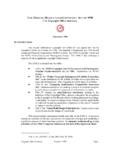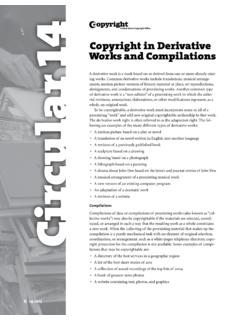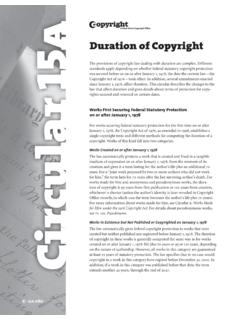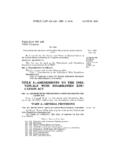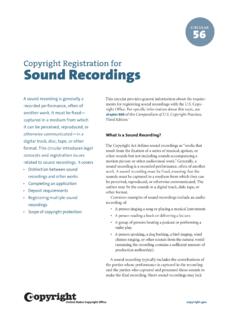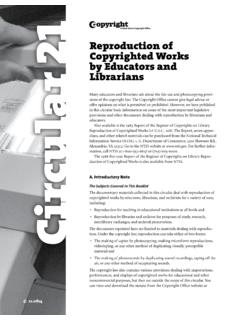Transcription of Recordation of Transfers and Other Documents
1 W Circular 12. Recordation of Transfers and Other Documents Whether or not a copyrighted work has been registered with the U. S. Copyright Office, owners of these works often enter into agreements that affect their own- ership rights . For instance, owners may transfer copyright ownership to another person. Owners may also authorize others to use their works, even giving some- one else control over ways in which a work is used. Under section 205 of the Copyright Act (title 17 of the United States Code), Documents pertaining to such agreements, and Other Documents pertaining to copyrights, may be recorded in the Copyright Office.
2 Recording a transfer of copyright ownership or Other document pertaining to a copyright with the Copyright Office under section 205 is voluntary. How- ever, to encourage document Recordation , the law confers certain legal advan- tages, including priority between conflicting Transfers and constructive notice . of the facts stated in the recorded document to the public if certain require- ments are met. (See Benefits of Recordation on page 2.) Any document per- taining to a transfer of copyright ownership or Other document pertaining to a copyright may be recorded as long as the person submitting it complies with the procedures set forth in the Copyright Act and the Office's regulations.
3 This circular explains what Recordation is, describes the benefits of and requirements for Recordation , and provides instruction on how to record a transfer of copyright ownership or Other document pertaining to a copyright with the Copyright Office under section 205. Please note, however, that this circular does not address the Recordation requirements for Documents related to notices of termination, designation of agents for online service providers, identification of anonymous/pseudonymous authors, author death statements, visual arts registry statements, or shareware registry statements.
4 Nor are docu- ments filed with the Licensing Division of the Copyright Office covered here. While this circular provides general information on the Recordation of trans- fers of copyright ownership and Other Documents pertaining to a copyright, it is not meant to provide legal advice about the rights or remedies of individuals under the Copyright Act. See 37 (a)(3). If you are unsure about a legal issue relating to Recordation , the Office suggests that you consult a knowl- edgeable attorney. What Is Recordation ? Federal law provides for the recording of Documents pertaining to copyright in one central location, the Copyright Office.
5 The Office maintains true and accu- rate copies of recorded Documents and makes them available for public inspec- tion. See 37 (b). The process of Recordation entails (1) receiving copyright-related Documents from remitters for Recordation ; (2) reviewing the Documents to ensure they are eligible for Recordation ; (3) indexing information contained in the Documents The procedural requirements for Recordation have been superseded by the Office's 2 interim rule on document Recordation and final rule on fees. For information on current practices see Recordation of Transfers and Other Documents 2.
6 For use in the Office's public catalog of recorded Documents ; What May Be Recorded (4) making copies of the Documents so they are available for public inspection; and (5) returning Documents marked as A document that Transfers copyright ownership or any Other recorded to remitters. The public catalog, which is available document pertaining to a copyright may be recorded in the on the Internet for Documents recorded after 1977, includes a Copyright Office if it meets the requirements described in description of each recorded document , including party the section entitled Requirements for a document to Be names, titles of works, registration numbers (when available), Recorded below.
7 Heading notes, and Other information. The Copyright Office does not enforce agreements that Transfers of Copyright Ownership are reflected in recorded Documents . Although the Copyright A transfer of copyright ownership is an assignment, mort- Office has minimum requirements that must be satisfied gage, grant of an exclusive license, transfer by will or intestate for a document to be recorded, such as the document being succession, or any Other conveyance, alienation, or hypoth- complete by its own terms, the Office does not determine ecation of any or all of the exclusive rights in a copyright, whether Documents satisfy legal requirements that are neces- whether or not it is limited in time or place of effect.
8 It does sary for the Documents to be effective or enforceable. not include a nonexclusive license. See 17 101 (defini- tion of transfer of copyright ownership ). A transfer of copyright ownership, Other than by opera- Benefits of Recordation tion of law, is not valid unless an instrument of conveyance (for example, contract, bond, or deed) or a note or memo- While the Recordation of a transfer of copyright ownership or randum of the transfer is in writing and is signed by the Other document pertaining to a copyright is not mandatory, owner of the rights conveyed or the owner's duly authorized there are several advantages to Recordation .
9 These include agent. See 17 204(a). the following: The Office will record a transfer of copyright ownership Under certain conditions, Recordation establishes legal after it has been executed by the parties. No special content priority between conflicting Transfers or between a trans- is necessary for the document Other than the requirements fer and a nonexclusive license. provided in the Copyright Act. Note, however, that parties wishing to record a transfer of copyright ownership should Recordation establishes a public record of the contents of submit to the Office the legal instrument that Transfers the the transfer or document .
10 Copyright from one party to another; describing the transfer Some courts have held that a security interest in a reg- will not suffice. istered work must be recorded with the Copyright Notarization and certificates of acknowledgment are Office in order to perfect the creditor's interest. unnecessary for the Recordation of Transfers of copyright Recordation of a document in the Office may provide ownership. Section 204(b) of the Copyright Act, however, the advantage of constructive notice, a legal concept states that a certificate of acknowledgment can serve as meaning that members of the public are deemed to have prima facie evidence of the execution of a transfer of copy - knowledge of the facts stated in the document and cannot right ownership if one of the two following conditions is claim otherwise.
